- Home
- Elizabeth George
Deception on His Mind Page 7
Deception on His Mind Read online
Page 7
Suzi was continuing. “Only in this case, one of the bags broke in this bloke's insides and he crawled in that pillbox to die. That way, he wouldn't disgrace his people. They're big on that as well, you know.”
Barbara returned to the article and began to read it in earnest. “Has the postmortem been released, then?” Suzi seemed so grounded in the certainty of her facts.
“We all know what happened. Who needs a postmortem? But tell that to the coloureds. When it comes out that he died of an overdose, they'll blame it on us. Just you wait and see.”
She turned on her heel and headed towards the kitchen. Barbara called, “My lemonade?” as the door swung shut behind her.
Alone again, Barbara read the rest of the article unimpeded. The dead man, she saw, had been the production manager at a local business called Malik's Mustards & Assorted Accompaniments. This concern was owned by one Akram Malik who, according to the article, was also a member of the town council. At the time of his death—which the local CID had declared took place on Friday night, nearly forty-eight hours before Barbara's arrival in Balford—Mr. Querashi had been eight days away from marrying the Malik daughter. It was his future brother-in-law and local political activist Muhannad Malik who, upon the discovery of Querashi's body, had spear-headed the local cry for a CID investigation. And although the enquiry had been handed over to CID immediately, no cause of death had as yet been announced. As a result of this, Muhannad Malik promised that other prominent members of the Asian community would be joining him to dog the investigators. “We would be foolish to pretend we are not aware of what ‘getting to the truth’ means when it's applied to an Asian,” Malik was quoted as saying on Saturday afternoon.
Barbara laid the newspaper to one side as Suzi returned with her glass of lemonade in which a single piece of ice bobbed with hopeful intentions. Barbara nodded her thanks and ducked her head back to the paper to forestall any additional commentary. She needed to think.
She had little doubt that Taymullah Azhar was the “prominent member of the Asian community” whom Muhannad Malik had promised to produce. Azhar's departure from London had followed too closely on the heels of this story for the situation to be otherwise. He had come here, and Barbara knew it was only a matter of time until she stumbled upon him.
She could only imagine how he would greet her intention to run interference between him and the local police. For the first time, she realised how presumptuous she was being, concluding that Azhar would need her intercession. He was an intelligent man—good God, he was a university professor—so he had to know what he was getting into. Hadn't he?
Barbara ran her finger down the moisture on the side of her lemonade glass and considered her own question. What she knew about Taymullah Azhar she knew from conversations with his daughter. From Hadiyyah's remark “Dad's got a late class tonight,” she had initially concluded that he was a student. This conclusion wasn't based so much on preconception as it was based on the man's apparent age. He looked like a student, and when Barbara had discovered that he was a professor of microbiology, her amazement had been associated more with learning his age than with not having had a racial stereotype affirmed. At thirty-five, he was two years older than Barbara herself. Which was rather maddening since he looked ten years younger.
But age aside, Barbara knew there was a certain naïveté that accompanied Azhar's profession. The ivory tower aspect of his career protected him from the realities of day-to-day living. His concerns would revolve round laboratories, experiments, lectures, and impenetrable articles written for scientific journals. The delicate dance of policework would be as foreign to him as nameless bacteria viewed beneath a microscope would be alien to her. The politics of university life—which Barbara had come to know at a distance from working a case in Cambridge the previous autumn—were nothing like the politics of policing. An impressive list of publications, appearances at conferences, and university degrees didn't have the same cachet as experience on the job and a mind for murder. Azhar would no doubt discover this fact the first moment he spoke to the officer in charge, if that indeed was his intention.
The thought of that officer sent Barbara back to the newspaper again. If she was going to muscle in with warrant card at the ready in the hope of buffering Taymullah Azhar's presence on the scene, it would help to know who was running the show.
She began a second, related story on the third page of the paper. The name she was seeking was in the first paragraph. Indeed, the entire story was about the officer in charge. Because not only was this the first “suspicious demise” that had occurred on the Tendring Peninsula in more than five years, it was also the first investigation to be headed by a woman.
She was the recently promoted Detective Chief Inspector Emily Barlow, and Barbara muttered, “Holy hell hallelujah,” then allowed herself a delighted grin when she saw the name. For she had done her last three detective courses at the training school in Maidstone, right at Emily Barlow's side.
This, Barbara concluded, was surely a sign: a bolt from the blue, a message from the gods, handwriting—in red neon lights, if you will—scrawled on the wall of her own future. This wasn't just a case of already being acquainted with Emily Barlow and thereby having an entree to the investigation based on a passing familiarity with the head of the team. This was also a case of the galloping meant-to-be's, having all the hallmarks of a spate of fortuitous on-the-job training that bore the potential of sending Barbara's career shooting off like a rocket. Because the simple fact was that nowhere was there a woman more competent, more suited for criminal investigations, and more gifted in the politics of policework than was Emily Barlow. And Barbara knew that what she could learn by working at Emily's side for a week was more valuable than anything covered in a textbook on criminology.
Emily's sobriquet had been Barlow the Beast during the detective courses they'd taken together. In a world in which men rose to positions of authority by simple virtue of being men, Emily had blasted her way through the ranks in the CID by proving herself equal to the opposite sex in every way. “Sexism?” she said one night in answer to Barbara's question on the topic. She'd been exercising furiously on a rowing machine, and she didn't slow her pace even a fraction as she replied. “It doesn't come up. Once blokes know you'll go for their cobblers if they step out of line, they don't. Step out of line, that is.”
And on she strode with one object in mind: attaining the position of Chief Constable of Police. Since Emily Barlow had made DCI at thirty-seven, Barbara knew that she would have no trouble reaching her goal.
Barbara bolted down the rest of her dinner, paid, and left Suzi a generous tip. Her spirits higher than they'd been in days, she went back to the Mini and started off with a roar. She could keep an eye on Hadiyyah now; she could see to it that Taymullah Azhar didn't cross any lines that could cause him trouble. And as an added bonus to her efforts, she could watch Barlow the Beast at work on a case and hope that something of the DCI's remarkable Stardust might rub off on a sergeant's shoulders.
“Do I NEED to send Presley to assist you, Inspector?”
DCI Emily Barlow heard the pointed question from her detective superintendent and translated it mentally prior to answering. What he really meant was “Did you manage to placate the Pakistanis? Because if you didn't, I have another DCI who can do the job adequately in your place.” Donald Ferguson was up for promotion to the Assistant Chief Constable's position, and the last thing he wanted was the heretofor well-greased pathway of his career to become suddenly cratered by political potholes.
“I don't need anyone's assistance, Don. The situation's under control.”
Ferguson barked a laugh. “I've got two men in hospital and a pod of Pakis ready to blow. Don't tell me what's under control, Barlow. Now how do things stand?”
“I told them the truth.”
“That's a brilliant move.” On the other end of the telephone line, Ferguson's voice was honeyed with sarcasm. Emily pondered why the Super was still
at work at this time of evening since the Pakistani demonstrators had long since dispersed and the superintendent had never been a man for burning the midnight oil. She knew he was in his office because she'd returned his phone call there, and she'd quickly memorised the number when it had become apparent to her that returning telephonic visitations from on high was going to be part of her new job. “That's really brilliant, Barlow,” he continued. “May I ask how long you think it will be before he takes his people to the streets again?”
“If you'd give me more manpower, we wouldn't have to worry about the streets or anything else.”
“You've got all you're getting. Unless you want Presley.”
Another DCI? Not on your life, she thought. “I don't need Presley. I need a visible police presence on the street. I need more constables.”
“What you need is to knock a few heads together. If you can't do that—”
“My job's not crowd control,” Emily countered. “We're trying to investigate a murder over here, and the family of the dead man—”
“May I remind you that the Maliks are not Querashi's family, despite the fact that these people seem to live inside each other's pyjamas?”
Emily blotted the sweat from her forehead. She'd always suspected that Donald Ferguson was in reality an ass in pig's clothing, and virtually every remark he made served to corroborate that suspicion. He wanted to replace her. He couldn't wait to replace her. The slightest excuse and her career was history. Emily dug for patience in her reply. “They're the family he was marrying into, Don.”
“And you told them the truth. They caused a bloody riot this afternoon and in response you told them the flaming truth. Do you have any idea what that does to your authority, Inspector?”
“There's no point in keeping the truth from them since they're the first group of people I'm intending to interview. Enlighten me, please. How did you expect me to conduct an investigation into a murder without telling anyone it's a murder we're dealing with?”
“Don't take that tone with me, Inspector Barlow. What's Malik done so far? Besides instigate a riot. And why the hell isn't he under arrest?”
Emily didn't point out the obvious to Ferguson: The crowd had dispersed once the television filming had ceased, and no one had been able to nab a brick thrower. She said, “He's done exactly what he said he'd do. Muhannad Malik's never made an idle threat, and I don't imagine we can expect him to start doing so just to accommodate us.”
“Thank you for the character sketch. Now answer my question.”
“He's brought in someone from London as he said he would. An expert in what he's calling ‘the politics of immigration.’ “
“Save us,” Ferguson muttered. “And what did you tell him?”
“Do you want my exact words or their content?”
“Stuff the innuendo, Inspector. If there's something you want to say, I suggest you say it outright and have done.”
There was plenty to say, but now was not the time. “Don, it's late. I'm bloody tired. It feels about thirty degrees in here, and I'd like to get home sometime before dawn.”
“That can be arranged,” Ferguson said.
Jesus. What a miserable little tyrant. How he loved to pull rank. How he needed to do it. Had the superintendent been in her office, Emily could imagine him unzipping his trousers to demonstrate which one of them was really the man. “I told Malik that we've called in a Home Office pathologist who'll perform the postmortem tomorrow morning,” she replied. “I told him Mr. Querashi's death appears to be what he himself thought it was from the first: a murder. I told him the Standard's got the story, and they'll run it tomorrow. Okay?”
“I like the sound of appears,” Ferguson said. “It gives us elbow room to keep the lid on things. See that you start doing just that.” He rang off in his usual fashion, by dropping the receiver into its cradle at his end. Emily held the phone away from her ear, gave it two fingers, and did the same at her end.
In the airless room that was her office, she grabbed a tissue and pressed it fully against her face. It came away greasily blotted. She would have given her big toe for a fan. She would have given her entire foot for air conditioning. As it was, she had only a lousy tin of warm tomato juice, which was better than nothing to ameliorate the effects of the day's blistering heat. She reached for this and used a pencil to prise open its pop-top. She took a swig and began to massage the back of her neck. I need a workout, she thought, and once again she acknowledged that one of the disadvantages of her line of employment—in addition to having to deal with pigs like Ferguson—was having to forego physical activity more often than was her natural inclination. If she'd had her way, she'd have been outdoors rowing hours ago, instead of doing what duty called upon her to do: return the day's phone calls.
She tossed the last of her returned telephone messages into the rubbish bin and followed them with the tomato juice tin. She was cramming a stack of file folders into her canvas hold-all, when one of the WPCs assigned to the Querashi investigation came to the doorway, trailing several pages of an uncut fax.
“Here's the background on Muhannad Malik you were asking for,” Belinda Warner announced. “Clacton's Intelligence Unit's just sent it over. You want it now or in the morning?”
Emily held out her hand. “Anything more than we already know?”
Belinda shrugged. “’F you ask me, he's nobody's blue-eyed boy. But there's nothing here to confirm it.”
This was what Emily had expected. She nodded her thanks and the WPC disappeared down the hall. A moment later her footsteps clattered on the stairway of the ill-ventilated building that served as the police station in Balford-le-Nez.
As was her habit, Emily glanced through the entire report quickly before making a more detailed study. One important issue stood out in her mind: Her superintendent's implicit threats and career ambitions aside, the last thing the town needed was a major racial incident, which is what this death on the Nez was fast becoming. June was the opening of the tourist season, and with the hot weather calling city dwellers to the sea, hopes in the community had begun to run high that the long recession was at last coming to an end. But how could Balford expect an influx of visitors if racial tensions took its inhabitants into the streets for confrontations with one another? The town couldn't, and every businessman in Balford knew it. Investigating a murder while simultaneously avoiding an outbreak of ethnic conflict was the delicate proposition before her. And the fact that Balford was teetering precariously on the edge of an Asian/English clash had been made more than evident to Emily Barlow that day.
Muhannad Malik—along with his cronies in the street—had been the messenger of this information. Emily had known the young Pakistani since her days in uniform when, as a teenager, Muhannad Malik had first come to her attention. Having grown up on the streets of South London, Emily had early learned to handle herself in conflicts that were often multi-racial, coincidentally developing the hide of an elephant when it came to taunts that were directed at the colour of her skin. So as a young police constable, she'd had little patience with those who used race as the wild card in each deck from which a hand was dealt them. And Muhannad Malik was someone who, even at sixteen, had waved the race card at every opportunity.
She had learned to give little credence to his words. She simply had not allowed herself to believe that all of life's difficulties could be put down to issues of race. But now there was a death to consider, and not only a death but a bonafide murder, with its victim an Asian who had been the intended bridegroom of Muhannad Malik's own sister. It was inconceivable that, when faced with this murder, Malik would not attempt to make a connection between its occurrence and the racism he claimed to see everywhere round him.
And if a connection could be established, the result would be the very thing that Donald Ferguson feared: a seaside summer of conflict, aggression, and bloodshed, all of which had been promised by that afternoon's chaos.
In response to what had occurred both i
nside and outside the town council meeting, phones at the police station had begun ringing in panic as the minds of Balford's citizens made the leap from placards and bricks to the acts of extremism which had been carried out globally in the past few years. And among those phone calls had come one from the Lady Mayor, the result of which was a formal request for information made to those officers whose job it was to assemble profiles of those most likely to cross the criminal line. The pages that Emily now held represented the material that the divisional headquarters’ intelligence unit had been gathering on Muhannad Malik for the past ten years.
There wasn't much, and most of it seemed innocuous, suggesting Muhannad at age twenty-six and despite his behaviour that afternoon, had mellowed from the hot-headed teenager who'd first come to the attention of the police. Emily had in her possession his school records, his GCSEs and A-levels, his university career, and his employment history. He was the respectful son to a member of the town's council, the devoted husband to a wife of three years, the committed father of two small children, and a competent manager in the family business. All in all, save for one blemish, he had grown into a model citizen.
But Emily knew that small blemishes frequently hid larger flaws. So she read on. Malik was the acknowledged and admitted founder of Jum'a, an organization for young male Pakistanis. The association's stated purpose was to strengthen the ties between Muslims in the community and to emphasize and celebrate the myriad differences between these same Muslims and the westerners among whom they lived. Twice in the past year, Jum'a's involvement had been suspected in altercations that had erupted between young Asians and their English counterparts. One was a traffic dispute that had turned into an ugly fistfight; one was an incident of bottles of cow's blood being thrown at an Asian schoolgirl by three members of her form. Assaults had occurred in the aftermath of both of these incidents, but afterwards no one had been willing to implicate Jum'a.

 Well-Schooled in Murder
Well-Schooled in Murder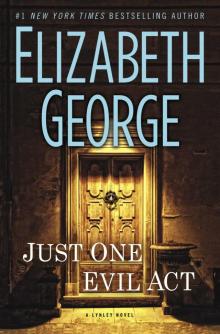 Just One Evil Act
Just One Evil Act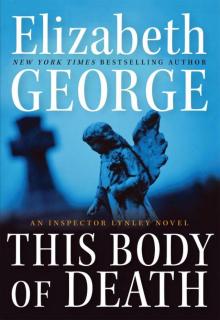 This Body of Death
This Body of Death The Edge of the Water
The Edge of the Water For the Sake of Elena
For the Sake of Elena Believing the Lie
Believing the Lie The Edge of the Shadows
The Edge of the Shadows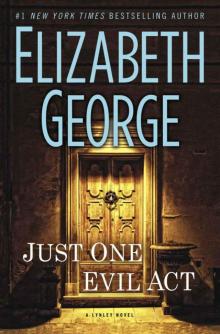 Just One Evil Act: A Lynley Novel
Just One Evil Act: A Lynley Novel In Pursuit of the Proper Sinner
In Pursuit of the Proper Sinner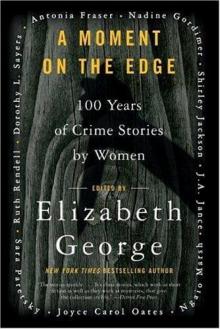 A Moment on the Edge:100 Years of Crime Stories by women
A Moment on the Edge:100 Years of Crime Stories by women Elizabeth I
Elizabeth I I, Richard
I, Richard A Traitor to Memory
A Traitor to Memory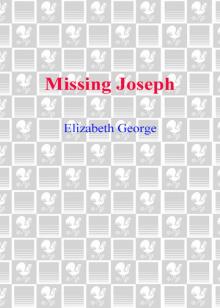 Missing Joseph
Missing Joseph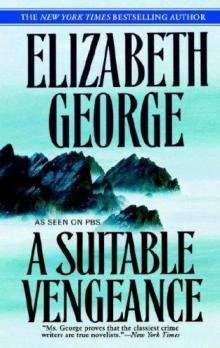 A Suitable Vengeance
A Suitable Vengeance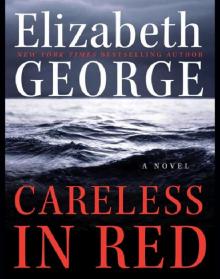 Careless in Red
Careless in Red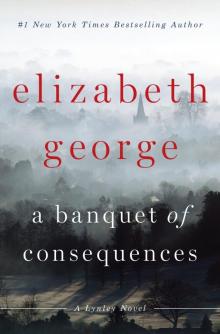 A Banquet of Consequences
A Banquet of Consequences Playing for the Ashes
Playing for the Ashes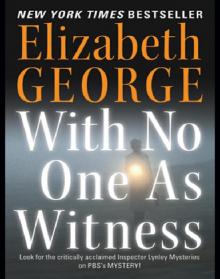 With No One As Witness
With No One As Witness Deception on His Mind
Deception on His Mind The Best American Mystery Stories 2016
The Best American Mystery Stories 2016 A Great Deliverance
A Great Deliverance In the Presence of the Enemy
In the Presence of the Enemy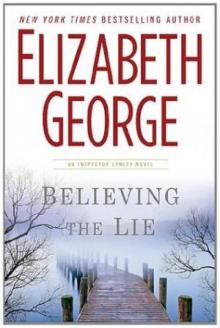 Believing the Lie il-17
Believing the Lie il-17 The Edge of the Light
The Edge of the Light SW01 - The Edge of Nowhere
SW01 - The Edge of Nowhere A Place of Hiding
A Place of Hiding What Came Before He Shot Her il-14
What Came Before He Shot Her il-14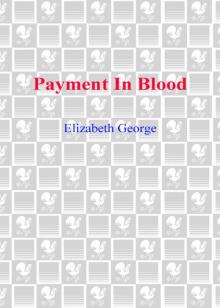 Payment In Blood
Payment In Blood The Punishment She Deserves
The Punishment She Deserves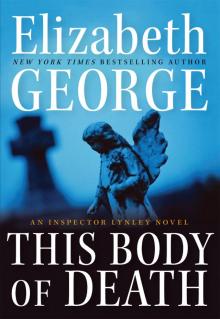 This Body of Death: An Inspector Lynley Novel
This Body of Death: An Inspector Lynley Novel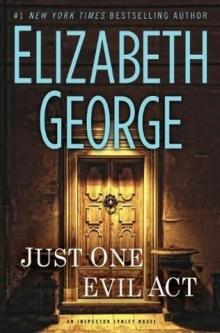 Just One Evil Act il-18
Just One Evil Act il-18 What Came Before He Shot Her
What Came Before He Shot Her Missing Joseph il-6
Missing Joseph il-6